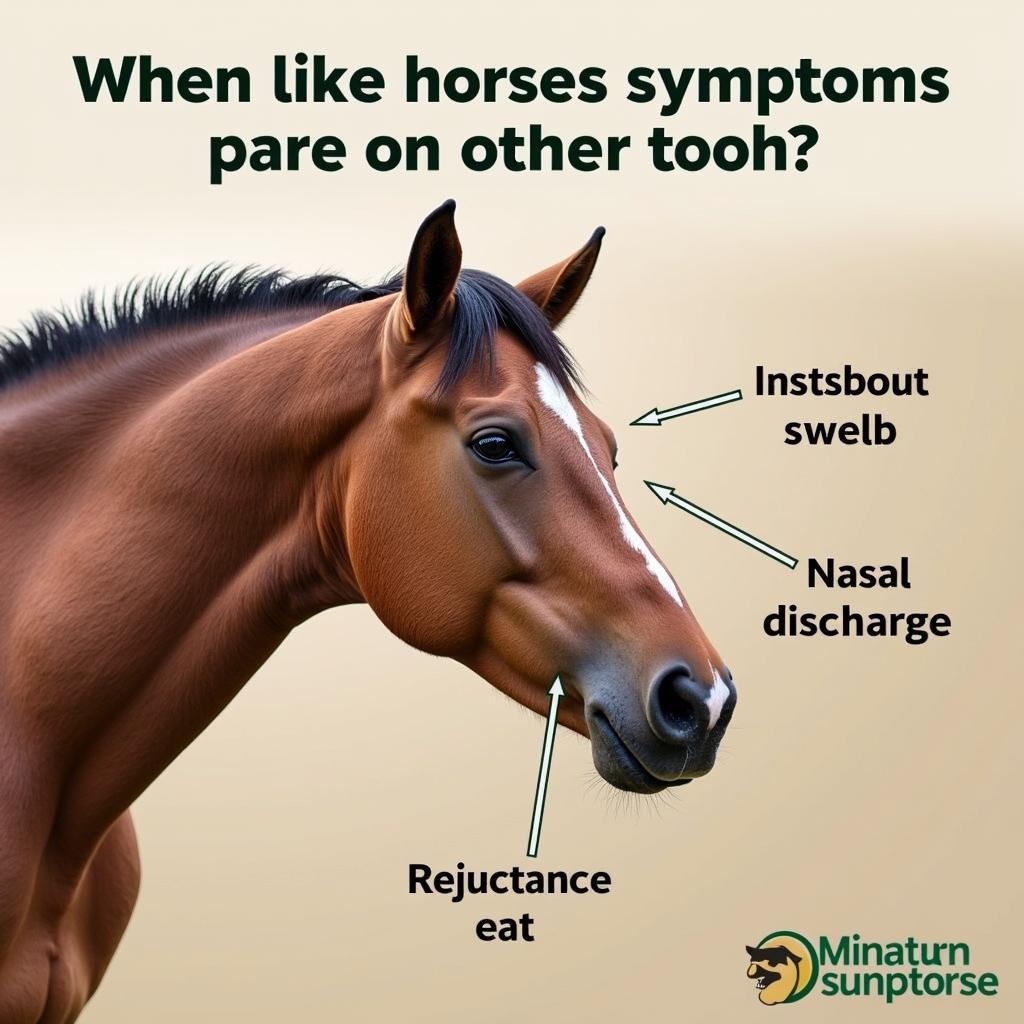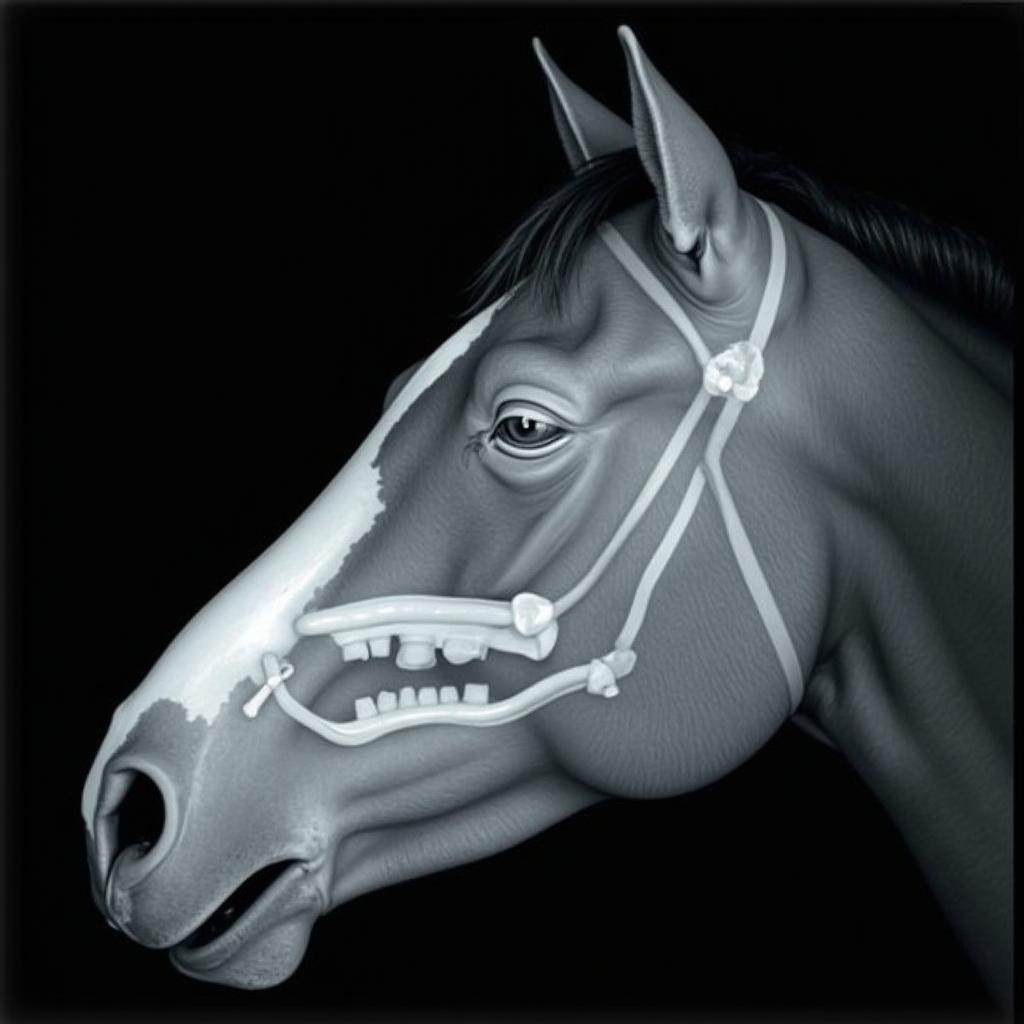Horse tooth abscesses are a serious dental issue that can cause significant pain and discomfort for your equine companion. While the words themselves might not sound familiar, recognizing the signs, understanding the causes, and knowing how to respond can be crucial for your horse’s well-being. This article delves into the intricacies of horse tooth abscesses, providing you with the knowledge to act swiftly and effectively should your horse ever face this condition.
 Horse Showing Tooth Abscess Symptoms
Horse Showing Tooth Abscess Symptoms
Recognizing the Signs of a Horse Tooth Abscess
Tooth abscesses in horses are often tricky to identify in their early stages. However, as the condition progresses, certain telltale signs become more apparent. Keep a close eye on your horse for any of the following symptoms:
- Facial Swelling: One of the most noticeable indicators is swelling along the jawline, often appearing on one side of the face.
- Nasal Discharge: A persistent, foul-smelling discharge from one nostril can be a strong indicator of a tooth root infection.
- Difficulty Eating: Horses with tooth abscesses may struggle to chew their food properly, often dropping food from their mouths or showing a reluctance to eat.
- Behavioral Changes: Your horse may exhibit signs of discomfort or pain, such as head shaking, teeth grinding, or general irritability.
 X-Ray of Equine Tooth Abscess
X-Ray of Equine Tooth Abscess
Understanding the Causes of Tooth Abscesses in Horses
Horse tooth abscesses occur when bacteria find their way into the pulp of the tooth, often through cracks, chips, or damage to the tooth enamel. This bacterial invasion leads to infection and the formation of pus within the tooth, causing pressure and pain. Some common contributing factors to equine tooth abscesses include:
- Dental Fractures: Broken or damaged teeth provide an entry point for bacteria to infect the sensitive inner layers.
- Periodontal Disease: Gum disease in horses, much like in humans, can compromise the gum line, allowing bacteria to reach the tooth roots.
- Uneven Tooth Wear: Horses have hypsodont teeth, meaning they continuously erupt throughout their lives. Uneven wear can create sharp points or hooks, increasing the risk of cracks and fractures.
Diagnosing and Treating a Horse Tooth Abscess
If you suspect your horse may have a tooth abscess, seeking immediate veterinary attention is paramount. Early diagnosis and treatment are vital in preventing further complications. A veterinarian experienced in equine dentistry will perform a thorough oral examination, possibly using specialized dental tools and X-rays to confirm the diagnosis.
Treatment for a horse tooth abscess typically involves:
- Draining the Abscess: This often requires creating a small opening in the tooth or gum to allow the pus to drain.
- Flushing and Cleaning: The affected area is thoroughly cleaned and flushed with an antiseptic solution to remove bacteria and debris.
- Antibiotics: Your veterinarian will prescribe a course of antibiotics to combat the infection and prevent its spread.
- Pain Relief: Non-steroidal anti-inflammatory drugs (NSAIDs) are essential in managing pain and inflammation associated with the abscess.
Importance of Routine Dental Care
Prevention is always better than cure, and this holds true for equine dental health as well. Regular dental checkups by a qualified equine dentist are essential for maintaining your horse’s oral health and preventing issues like tooth abscesses. Most horses benefit from a dental exam and float (teeth filing) at least once a year, though some may require more frequent visits depending on their age, breed, and individual dental conformation.
When to Seek Immediate Veterinary Attention
While this article provides a general overview of horse tooth abscesses, it’s crucial to remember that each case is unique. If you notice any of the symptoms mentioned above or observe anything unusual about your horse’s eating habits or behavior, do not hesitate to contact your veterinarian immediately.
Expert Insight:
“Early detection is key when it comes to horse tooth abscesses,” says Dr. Emily Carter, DVM, an equine veterinarian with over 15 years of experience. “The sooner we can diagnose and treat the abscess, the better the prognosis for a full recovery.”
Don’t delay seeking professional veterinary care if you suspect your horse has a tooth abscess. Prompt action can save your horse from significant pain and potential long-term dental complications.
Frequently Asked Questions about Horse Tooth Abscesses
Can a horse tooth abscess heal on its own?
Unfortunately, horse tooth abscesses rarely heal on their own. Without proper treatment, the infection can spread, leading to more severe complications like bone infection or even tooth loss.
How long does it take for a horse tooth abscess to heal?
With prompt and appropriate treatment, most horse tooth abscesses begin to improve within a few days. However, full recovery can take several weeks, depending on the severity of the abscess and the horse’s overall health.
What are the long-term effects of a horse tooth abscess?
If treated early and effectively, horse tooth abscesses typically don’t have long-term consequences. However, delayed treatment or recurrent abscesses can lead to chronic dental problems, potential bone loss, and ongoing discomfort for the horse.
Can I prevent my horse from getting tooth abscesses?
While you can’t entirely eliminate the risk, providing your horse with routine dental care, including annual checkups and floats, significantly reduces the likelihood of developing tooth abscesses.
What should I feed my horse if it has a tooth abscess?
Horses with tooth abscesses often find chewing painful. Offer them soft, easily digestible feeds like soaked hay cubes, mashes, or senior feeds until they regain their appetite and chewing ability.
Need Help with Your Horse’s Dental Health?
At Justus Horses USA, we understand that your horse’s well-being is your top priority. If you have any concerns about your horse’s dental health, need to schedule a dental checkup, or have any questions about equine dentistry, don’t hesitate to reach out.
Contact us today!
Phone: 0772127271
Email: [email protected]
Address: QGM2+WX2, Vị Trung, Vị Thuỷ, Hậu Giang, Việt Nam
Our dedicated team is available 24/7 to provide support and guidance on all aspects of horse care.